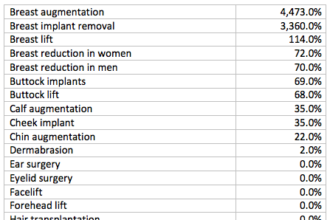 It’s common knowledge that health care costs in the United States are higher than in other countries. But, just how big is the chasm? The United States currently spends more than 18 percent of its GDP on health care.
It’s common knowledge that health care costs in the United States are higher than in other countries. But, just how big is the chasm? The United States currently spends more than 18 percent of its GDP on health care.
 It’s common knowledge that health care costs in the United States are higher than in other countries. But, just how big is the chasm? The United States currently spends more than 18 percent of its GDP on health care. In 2010, it was 17.6 percent, which translated to $8,233 a year per person. That figure is over two times higher than the $3,268 per person average of other developed nations. A discrepancy that big leads many to wonder why costs are so much higher in the United States than in other countries.
It’s common knowledge that health care costs in the United States are higher than in other countries. But, just how big is the chasm? The United States currently spends more than 18 percent of its GDP on health care. In 2010, it was 17.6 percent, which translated to $8,233 a year per person. That figure is over two times higher than the $3,268 per person average of other developed nations. A discrepancy that big leads many to wonder why costs are so much higher in the United States than in other countries.
Before we take a look at a few of the primary reasons why health care costs are so high in the United States, we’ll touch on the number one myth surrounding the skyrocketing costs – medical malpractice. Why? When we focus on nonissues, it detracts from the true goal of working to resolve the issues that are truly responsible for the increase.
Malpractice Fallacy
Many people falsely believe that medical malpractice is a driving force behind the skyrocketing cost of health care. However, that’s simply not true. According to a report by Public Citizen, less than one-tenth of one percent of the United States total health care costs in 2012 resulted from claims paid in medical malpractice suits. Not only that, but in 2012, medical malpractice payouts were 3.4% lower than they were in 2011. So, if medical malpractice isn’t to blame, then what is?
Administrative Costs
The price of operating the administrative component of the health care system in the United States consumes about one quarter of the overall cost (significantly higher than other countries), according to Harvard Professor of Applied Economics, David Cutler. Administrative costs cover everything from billing and collection to insurance related activities.
It seems counterintuitive, but entity consolidation doesn’t help to lower administration costs either. In fact, the opposite is true. Insurance giant Aetna reports that, between 2009 and 2010, hospital acquisitions and mergers increased by 33 percent. Aetna also reports that, in areas where hospital mergers have been concentrated, there is a 20 percent price increase in health care costs.
Prescription Drug Costs
The cost for prescription drugs runs 50 percent higher in the United States than in other countries. Sure, overhead is higher in the United States than most other nations. However, if the United States charged the same prices for prescription drugs as other countries charge, that single move would be enough to shave about $100 billion a year off the total health care costs alone. How about just meeting in the middle, cutting the costs in half, and saving ourselves $50 billion a year?
Lifestyle Choices
Lack of personal accountability is another driving force behind the crippling health care costs in the United States. By 2023, it’s projected that there will be a 42 percent increase in medical cases involving chronic disease, such as obesity, diabetes, and heart disease. Aetna estimates that will add a total of about $4.2 trillion to the tab. Obesity alone accounts for roughly 12 percent of the increase in health care spending.
Bright Side
Of course, a lot of good comes out of the United States health care industry, too. For example, the U.S. is at the head of the pack when it comes to cancer treatment and health care research. Compared to other countries, the United States has the highest five-year survival rate for breast cancer patients, and the survival rate for colorectal cancer patients is also among the best in the world.
While the research and cancer statistics are obviously good news, they don’t exclusively account for the estimated $2.8 trillion spent on health care in the United States in 2013. The high price of prescription drugs, the multilayered and convoluted administrative costs, and our lack of personal accountability all merge to give the United States the dubious title of being the country with the highest health care costs in the world.
The only way we can effectively combat that title, and turn the tide, is if we develop sensible and streamlined systems of administration, lower the cost of prescription drugs, and start making healthier personal choices. Casting blame on factors that have very little to do with the outrageous cost of health care, such as medical malpractice claims, will only detract from the real issues, and prevent us from creating a health care system that is as we should be – fit and lean.
(Medical malpractice / shutterstock)








